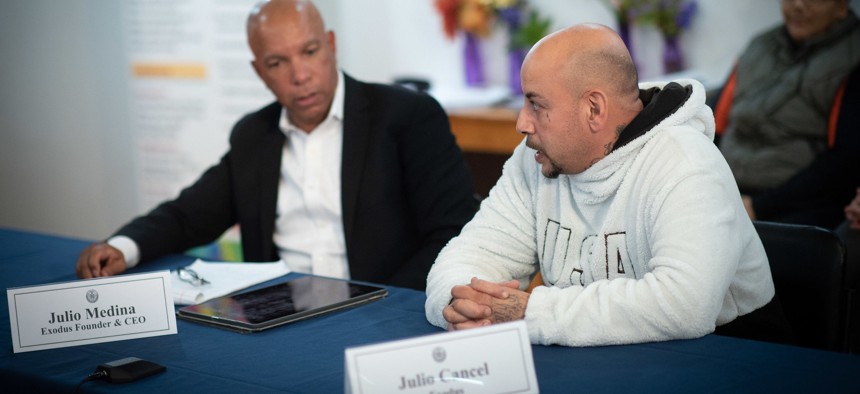Opinion
Opinion: Exodus Transitional Community deserves a second chance
The organization has suffered criticism that shows a double standard in punishing nonprofits led by and made up mostly of formerly incarcerated individuals

Exodus Transitional Community founder Julio Medina speaks with Julio Cancel, a formerly incarcerated person, during a criminal justice related roundtable at the nonprofit's office in East Harlem in 2019. Michael Appleton/Mayoral Photography Office
The idea of second chances is a fundamental aspect of our legal system and one that should be extended beyond just the legal system. After all, second chances are what give us the opportunity to grow, learn from our mistakes, and make a positive impact on the world around us. Unfortunately, there are times when society forgets this basic principle, and individuals or groups are punished too severely for a single mistake.
The recent situation with Exodus Transitional Community, a five-star non-profit organization, as rated by Charity Navigator, is a prime example of society forgetting the basic principle of second chances. Exodus Transitional Community has helped countless incarcerated and formerly incarcerated individuals turn their lives around and become productive members of society. They have hired thousands of people, provided housing, formed leading successful crime prevention programs, and created a culture of work ethics that has helped break the cycle of poverty and incarceration for many. Few organizations have had a more positive impact on public safety or a more pristine record than theirs. There's no denying that Exodus is widely regarded as a premier justice social service agency around the country.
Here are a couple of facts: During the onset of the COVID-19 crisis, Exodus Transitional Community stood out as the only non-profit organization that responded to the mayor’s call for help reducing the population at Rikers. In less than four months, their re-entry hotel program allowed for a safe and rapid decrease in Riker’s population from 5,500 to 3,700. Notably, thanks to the wrap-around services provided by Exodus, crime rates among this population did not increase. Additionally, Exodus was an essential employer during the pandemic, providing jobs for 350 individuals, with 85% of them impacted by the legal system.
Simply put, Exodus fills in with remarkable success precisely where the state and city often fail.
Despite Exodus’ outstanding record and long history of offering work experience, housing, counseling, and a sense of community for formerly incarcerated individuals, the city pulled contracts and urged the founder and CEO Julio Medina to resign when a few employees engaged in misconduct. While it is understandable that the state would want to take action to address the issue of staff misconduct, it seems that there is a double standard at play here that we cannot ignore.
There have been several recent examples in New York City where individuals or organizations have been given second chances despite a few employees’ misconducts. For instance, in 2019, the New York City Police Department was found to have engaged in racial profiling and discriminatory practices. However, the NYPD commissioner did not step down and the department’s budget increased the next year. Additionally, in 2018, the New York City Housing Authority was found to have failed to address lead paint in public housing, endangering the health of residents. However, the agency operation budget was not decreased, and the CEO did not resign. Another example of this double standard can be seen in the case of the New York City Education Department. In 2018, the department was found to have mishandled sexual harassment allegations against officials, yet no official was fired, and the department did not face any major consequences – and certainly its budget was not slashed.
These examples illustrate the double standard that exists when it comes to giving second chances and a measured approach. It is the height of hypocrisy for local officials to hold Exodus Transitional Community to a standard that they dare not apply to themselves. When a few police officers behave unprofessionally, it's often said that they don't represent the entire police force. However, when a nonprofit organization led by and made up mostly of formerly incarcerated individuals experiences issues, the response can be harsh and unforgiving, with little recognition of the positive impact the organization has had on society for decades. This reflects a built-in flawed perspective on formerly incarcerated individuals.
In my role as the director of community engagement at the Parole Preparation Project, I can attest Exodus’s decreased presence in the field has had drastic ripple effects in our communities while shifting significant burdens to other under-funded nonprofits.
By providing comprehensive support and services to individuals returning from incarceration, Exodus has been successful in reducing recidivism rates and empowering individuals to lead fulfilling lives. Their dedication and impact have been recognized by numerous organizations and individuals, making them indispensable assets to the community. Public officials must not let the actions of a few individuals tarnish the critical work that Exodus does. Rather, public officials should stand in solidarity with them and advocate for their continued increased presence in the justice social service sector.
Anthony Dixon served 32 years in the New York State prison system. He was released in 2016 and is currently the director of community engagement of the Parole Preparation Project, a nonprofit based in New York City that advocates for currently incarcerated people.
NEXT STORY: Opinion: Background checks and blanket hiring exclusions don’t reduce risk – they limit opportunities
